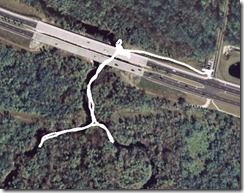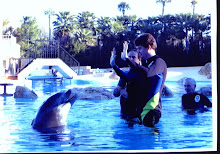If the trip was a failure, why am I posting it? In fact, if it can't be called a trip at all, with barely twenty minutes on the water, why am I posting it? Well, here's what happened and why.
I'm on vacation this week and wanted to paddle several different routes to post about, including the full (navigable) length of the Econlockhatchee River. Last week I paddled the middle segment and really wanted to paddle the upper today, but the upper part of the Econ can be tricky, with low water and a lot of debris.
Over the weekend, I stopped by to look at both of the put-ins on Highway 50 -- Blanchard Park and Hidden River RV. Blanchard Park is on the Little Econ and Hidden River is on the Big Econ -- the two rivers meet at highway 419, entering the Little Big Econ State Forest (hence the silly name for the forest):
View Larger Map
Blanchard Park was right out -- the water level was very low and every bend was clogged with growth. There'd be no putting in here.
Hidden River was worse -- I didn't even see the water, just spoke to the manager who told me they weren't putting in because of the low water.
Not to be deterred, I figured I'd just put in at 419 and paddle upstream as far as I could. I'd just paddled 419 to Snow Hill Road the week before, so I should be able to get some distance upstream from there before it got too bad, right?
Well, about twenty yards up the Little Econ I find the first obstruction -- completely blocking the river, so I have to pull over. Around the next bend, there's another one and I can see two more beyond it. Little Econ's clearly not an option, let's try the Big Econ.
Here it's worse -- I get to the first blockage and can see three more beyond it. One of which I might be able to paddle around, but the others are completely blocking the river.
 View in Google Earth
View in Google Earth
(download Google Earth)
At this point, I realize I'm not going to paddle the upper stretch today, so I head back and start thinking about what to do instead. I could pass 419 and paddle the middle-segment again, but I just did that last week and I want something new to blog about. Besides, since my plan was to paddle upstream and then back, I hadn't made any plans with kitten for her to pick me up.
So I packed things up and headed to Moss Park to paddle Lake Hart.
Now, why did I bother posting this for a trip that went nowhere when I wound up paddling someplace else?
When I started paddling twenty-some years ago, all the "trip reports" were in magazines. As I read about those trips and then took my own, I saw a disconnect -- there was something missing.
The stories in the magazines were of only two flavors: the trip either went perfectly or catastrophically. Meaning, it was all cotton-candy clouds and pink bunnies showing up at the campsite come sundown; or, it was lost at sea for seven days, praying for rain to drink and trying to take down seagulls with a paddle.
When I started taking my own trips, it was mostly solitary. I didn't have a family background of camping or paddling, so I was learning it all from scratch on my own -- and my trips didn't go like those in the magazine. There were no pink bunnies. I forgot things, I lost things, I tipped the boat over -- I set fire to my tent once (a little bit) ... and I started to wonder if I was completely incompetent at this outdoors-stuff.
Over time, as I met other paddlers and we shared stories, I realized that virtually every trip has something go wrong, that every paddler screws up once in a while, and that the magazines didn't include that sort of thing because of limited space and the belief that most people don't want to read about the mishaps.
I see the same thing on the Internet today. The mishaps and mistakes tend to get edited out and the Trips That Never Were aren't reported.
But those mishaps and mistakes are good, valuable information. As a software developer I take a look back at every project and try to find the Lessons Learned -- places were we screwed up, so we can remember them next time and try not to do it again. But those lessons only benefit others if they're shared.
So that's what I decided to do with this blog -- as part of every trip report, I'm going to include what went wrong. And why I think it went wrong and what I plan to do to keep it from happening again.
Maybe, someday, someone'll be setting up camp and say to themselves: "Wait a minute ... this is how that dumb-ass burnt down his tent ..." -- and won't make the same mistakes I have. (It didn't burn down; it just burnt a little bit.)
What did I learn from this morning? Well, two things:
First, I should have listened to the guy at Hidden River. He's there by the water every day and he told me the river was too low.
Second, even if the water conditions were better, I should have used a different boat. Under perfect conditions, I might have been able to paddle that route in the 16.5' Tarpon, but it probably wasn't the best choice. I should have taken my daughter's 9' Swifty, which would have made it a lot easier to pull over things, and might've changed a dismal failure to something challenging and fun.
There's no such thing as a boat that's good in all environments, and even though I prefer the Tarpon (shoving my 6'-2" self into the Swifty's cockpit is a chore), it wasn't the right boat for this segment of the river on this day.







No comments:
Post a Comment